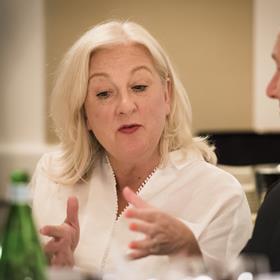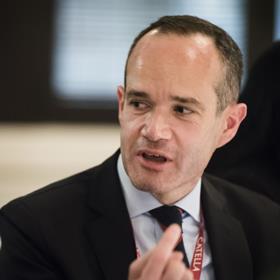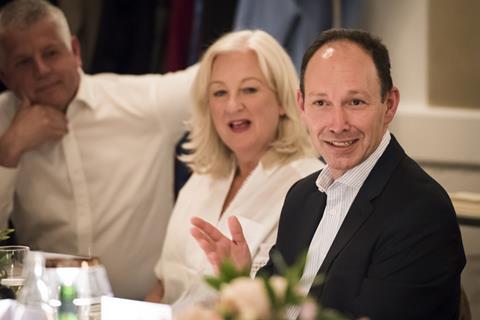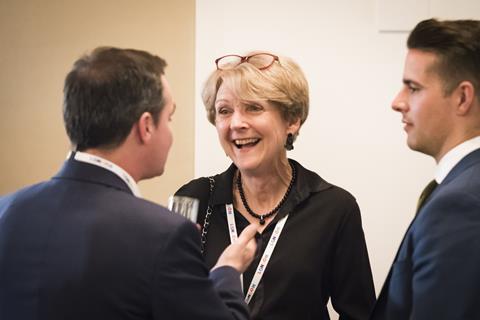The leading industry figures who gathered for the Mipim editor’s dinner last week felt that property had the resilience to weather the current political uncertainty surrounding Brexit, while the future of retail, the housing crisis and the social impact of development were the more long-term issues up for debate

Shifting sands, be they political, social or operational, dominated discussions at the Mipim editor’s dinner last week, when the New West End Company and James Andrew International brought a group of industry leaders together to discuss this year’s festival and the challenges real estate is facing.
With just a fortnight until the original 29 March Brexit deadline day, the topic was fresh in the guests’ minds. But as MPs voted to rule out a no-deal Brexit, they agreed that there had been little discussion about political unease at Mipim.
British Property Federation chief executive Melanie Leech said: “People are so frustrated and are in such despair about the abject failure of our politicians to show some leadership and give us a way forward that it’s not worth talking about. What can you say other than that? Mipim is all about the long-term view and long-term investment prospects for the UK.”
Those prospects are hard to predict on this side of Brexit, after a slow start to the year in capital market transactions.
United Trust Bank MD Harley Kagan warned that while people are confident that international capital will flood back into the UK when Brexit is resolved, “people make short-term decisions today because of immediate uncertainty that have long-term implications. Momentum takes a long time to build”.
Barry Williamson, Coutts’ head of commercial real estate, said: “Our clients are telling us they need certainty. We have these shifting sands that we’re trying to build on. But one thing I love about the real estate industry is its resilience.”
Another part of the industry seeing a shift in the ground beneath it is the retail sector and discussion turned to the delicate balancing act ongoing between stores and ecommerce.
Panellists
James Cooksey, director of Central London, The Crown Estate
Craig McWilliam, chief executive officer, Grosvenor Britain & Ireland
Matt Farrell, director, Trophaeum Asset Management
Manuel Criado-Romero, director, Pontegadea Ros Morgan, chief executive, HOLBA
Charles Begley, executive director, City & Westminster Property Association
Barry Williamson, head of commercial real estate, Coutts
Jeremy Grey, managing director, James Andrew International
Findlay Macpherson, consultant, James Andrew International
Paul Turton, head of sales – property development, United Trust Bank
Harley Kagan, managing director, United Trust Bank
Liz Peace, chair, Old Oak and Park Royal Development Corporation
Susan Freeman, partner, Mishcon de Reya
Tom Bloxham MBE, chairman and co-founder, Urban Splash
Melanie Leech CBE, chief executive, British Property Federation
Deborah McLaughlin, managing director, GL Hearn
Tyler Goodwin, founder, Seaforth Land
Sally Bruer, head of research, Tritax
Bruce Dear, partner, Eversheds Sutherland
Ann Marie Aguilar, director of operations, Europe, International WELL Building Institute
Sarah Welton, vice-president, market solutions, International WELL Building Institute
Liz Hamson, editor, Property Week
Harvey Soning, chairman, James Andrew International
Jace Tyrrell, chief executive, New West End Company
Emma Shone, senior reporter, Property Week

Jace Tyrrell, chief executive of New West End Company, said a change in business rates would support the retail sector and argued that the government must adapt and find tax revenue elsewhere before retail moves entirely online.
Sally Bruer, head of research at Tritax, said online and offline retail shouldn’t be looked at as separate to each other, because customers will continue to want a combination.
“Customers look online then buy in store, or look in store and buy online, or do click & collect,” she pointed out. “The blending of the two is huge; saying this is this and that is the other doesn’t work.”
Online revolution ignored
The guests widely agreed that real estate had seen the online retail revolution coming; it had just ignored the signs.
“We saw stores closing and consolidating and supermarkets bringing in concessions to take up space,” said GL Hearn MD Deborah McLaughlin. “The intelligence was there from our business rates community, but we didn’t gather that insight and we still don’t use it.”

Bad communication contributed to real estate’s lack of action in the face of the ecommerce surge, McLaughlin added. “Retail people and the people who own and run their properties don’t talk to each other enough. Retail people usually see trends sooner, but property people don’t react until they’re instructed to.”
Looking ahead, guests agreed that steering high streets away from pure retail offerings towards mixed-use areas with a combination of residential, retail and offices would help keep shops open and support communities.
Liz Peace, chair of Old Oak and Park Royal Development Corporation, voiced her support for local authorities using compulsory purchase orders to do this. “As long as you’re using it to support people who still want to be in the high street but to help them move, to free up the property around that core retail, and if it’s planned properly, it can be used for the benefit of a new high street.”

Harvey Soning, chairman of James Andrew International, pointed out that while the debate was focusing on retail, the real issue the real estate industry needed to focus on was the UK’s housing shortage.
“We need 300,000 homes a year; we’re going to build about 220,000. How are we going to supply the population with the houses they need? The government is doing nothing at the moment – why does the public need places to shop if they don’t even have a place to live?”
Experiences with housing are the closest contact the general public will have with the real estate sector, said the BPF’s Leech, making it crucial to get those experiences right to boost the public’s faith in the industry and make working with them on new developments easier.
Evaluating social impact
Ann Marie Aguilar, director of operations, Europe, at the International Well Building Institute, said that the time was fast approaching when “we are going to be asked to evaluate our social impact for developments we bring forward”. She added: “We’re going to have to tell the story about what the development is going to do for the local community. So how do we evaluate that?”
Charles Begley, executive director of the City & Westminster Property Association, agreed that the sector needs to get better at communicating the good it is doing for the general public.

He said: “There is a huge trust deficit between property and people and the contribution we make to communities. For so many years our contributions have been negotiated behind closed doors and all people see are a few pictures from Mipim.”
Engagement with the public, said Sarah Welton, president of the International WELL Building Institute’s New York office, will take on a new importance as the world shifts further into its digital revolution.
“We have a special opportunity to engage with people on the street. I’ve got a 10-month-old and there is all this energy directed at getting her on to a digital device; everyone wants her eyeballs. So how do we get her on to the street, engaging with the people around her? We have that power; we are affecting the built environment,” she said.
That power is a long-term responsibility, the guests agreed, with a consensus that the real estate industry will continue to thrive and embrace changes to the political and technological climates long after it has weathered the storm of the coming weeks. This industry, they agreed, will stand firmly on the rock it is built on.













































No comments yet